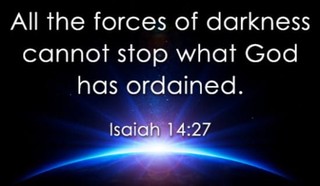- Recent Translations
- All Translations
Ésaïe 14:9
Share
Settings
Ésaïe 14:9 Meaning and Commentary
Hell from beneath is moved for thee
Or the "grave", or the place and state of the dead, and particularly of the damned, meaning those that are in such a place and state; and the sense is, that not only the inhabitants of the earth, and the trees upon it, express their joy at the fall of the king of Babylon, but those that are under the earth, in the grave, or in hell, are affected with it, and moved on account of it, not with fear and dread, as they were in his and their life time, as Kimchi suggests; but they are represented as in motion, and that as attended with a great noise, because of the multitude of them, upon hearing of his death, and his entrance into the regions of the dead: to meet [thee] at thy coming:
as kings used to be met when they, and as he used to be when he, entered into any city that was taken, to salute him, and congratulate him upon his entrance into the dark regions of death, the grave, and hell; a biting sarcasm: it stirreth up the dead for thee;
the dead that are in it, in hell or the grave; not to oppose him, but to welcome him into their parts, as being now one of them, and to be joined to their company; hell or the grave is said to rouse them, as if they were asleep, and took no notice of the death of so great a monarch, who was just making his public entry among them. The word "Rephaim", here used, is sometimes rendered "giants", as in ( Deuteronomy 2:11 Deuteronomy 2:20 ) and Jarchi interprets it of the Anakim; and so the Targum,
``it raiseth up unto thee mighty men;''for not the common people among the dead, but the princes and great ones of the earth, whom the Babylonian monarch had subdued and slain, and to whom he was well known, are intended, as appears by what follows: [even] all the chief ones of the earth;
or the "great goats"; the leaders and commanders of the people, who, as goats go before and lead the flock, so they the people. The Targum calls them
``all the rich in substance;''who were persons of wealth, power, and authority, when on earth: it hath raised up from their thrones all the kings of the nations;
to offer in a jeering manner their thrones to him, who had been obliged, in their life time and his, to surrender to him their crowns, and thrones, and kingdoms; but by their thrones here are meant their sepulchres, built, as many of them were, in great pomp and splendour; for kings at death have no other thrones but their graves. Aben Ezra says, it was the custom of the Babylonians to set thrones in the sepulchres of their kings.
